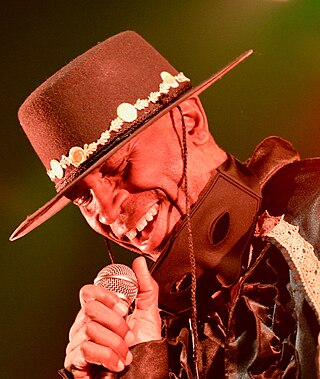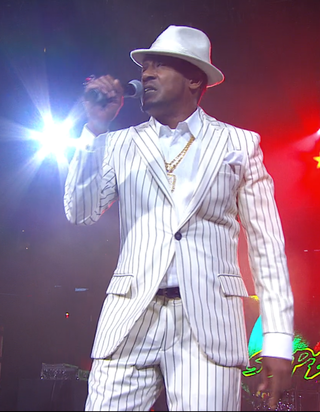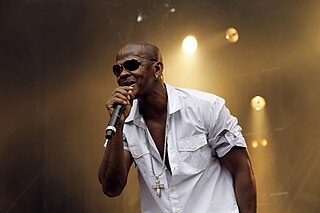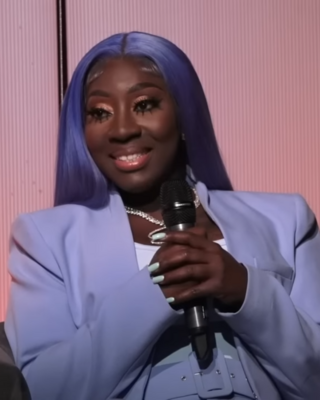
Reggae is a music genre that originated in Jamaica in the late 1960s. The term also denotes the modern popular music of Jamaica and its diaspora. A 1968 single by Toots and the Maytals, "Do the Reggay", was the first popular song to use the word reggae, effectively naming the genre and introducing it to a global audience. Reggae is rooted out from traditional Jamaican Kumina, Pukkumina, Revival Zion, Nyabinghi, and burru drumming. Jamaican reggae music evolved out of the earlier genres mento, ska and rocksteady. Reggae usually relates news, social gossip, and political commentary. It is instantly recognizable from the counterpoint between the bass and drum downbeat and the offbeat rhythm section. The immediate origins of reggae were in ska and rocksteady; from the latter, reggae took over the use of the bass as a percussion instrument.

Mark Anthony Myrie, known professionally as Buju Banton, is a Jamaican dancehall, ragga, and reggae singer. He is one of the most significant and well-regarded artists in Jamaican music. Banton has collaborated with many international artists, including those in the hip hop, Latin and punk rock genres, as well as the sons of Bob Marley.
Dancehall is a genre of Jamaican popular music that originated in the late 1970s. Initially, dancehall was a more sparse version of reggae than the roots style, which had dominated much of the 1970s. In the mid-1980s, digital instrumentation became more prevalent, changing the sound considerably, with digital dancehall becoming increasingly characterized by faster rhythms. Key elements of dancehall music include its extensive use of Jamaican Patois rather than Jamaican standard English and a focus on the track instrumentals.

Sean Paul Ryan Francis Henriques is a Jamaican reggae and dancehall singer and rapper. He released his first album, Stage One, in 2000. However, it was in 2002 that he gained international fame after releasing his next album, Dutty Rock. The single "Get Busy" topped the Billboard Hot 100 chart in the United States, as did "Temperature" (2005), off his third album, The Trinity. Paul frequently invokes the nickname "Sean da Paul", originating from the similarity between his stage name and cricketer Shivnarine Chanderpaul.

Eek-A-Mouse is a Jamaican reggae musician. He is one of the earliest artists to be described as a "singjay". Eek-A-Mouse is well known for pioneering his own style of scatting, differing from the-then toasting deejays in the 80s.

William Anthony Maragh, also known as Super Cat, is a Jamaican deejay who achieved widespread popularity during the late 1980s and early 1990s dancehall movement. His nickname, "Wild Apache", was given to him by his mentor Early B. Super Cat is considered one of the greatest deejays in the history of the Jamaican dancehall scene.
Bobby Dixon, known as Bobby Digital, was a Jamaican reggae and dancehall producer. He was given his nickname "Bobby Digital" because King Jammy, with whom he worked in the mid-1980s, had begun experimenting with digital rhythms at around the same time. He owned the Digital B label, and among the artists with hits on the label are Shabba Ranks and Sizzla. He has influenced reggae artists such as Admiral Tibet.

Keith Blair, better known by the stage name Anthony B, is a Jamaican DJ and member of the Rastafari movement.

Windel Beneto Edwards, better known by his stage name Gyptian, is a Jamaican reggae singer. He often appears with roots reggae songs within the reggae subgenre dancehall.
Stop Murder Music is a campaign to oppose Caribbean artists who produce music with lyrics alleged to glorify murder of homosexual men. The campaign was mainly against Jamaican musicians, primarily dancehall and reggae artists such as Buju Banton, Bounty Killer, and the Bobo Ashanti Rastafarians Sizzla and Capleton.

Jepther McClymont OD, better known as Luciano, is a Jamaican second-generation roots reggae singer.

Rise to the Occasion is reggae, dancehall artist Sizzla's eighteenth studio album. The album was released on September 30, 2003. The album is a mix of dancehall and reggae, with singles such as "Rise to the Occasion" and "Give Me a Try".

Ghetto Revolutionary is a studio album by the reggae and dancehall artist Sizzla. It was released on September 24, 2002. The album is a mix of dancehall and reggae. The album's hit single "Ghetto Revolution," is about the trials and tribulations that people have to go through in the ghetto of Kingston, Jamaica.
Reggae fusion is a fusion genre of reggae that mixes reggae and/or dancehall with other genres, such as pop, rock, hip-hop/rap, R&B, jazz, funk, soul, disco, electronic, and Latin music, amongst others.

Clifford Smith, better known as Mr. Vegas, is a Jamaican dancehall singjay.

I-Testament is a studio album by reggae/dancehall artist Capleton. It was released in 1997 via Def Jam. The album contains guest appearances from Q-Tip, Sizzla, Big Youth, and D.V. Alias Khrist.
Kemar McGregor, also known by his nicknames, DJ Flava and Flava McGregor, is a Jamaican-American pop reggae producer. He has recorded and produced music for the most renowned artists in the music industry, including Sinéad O'Connor, Musiq Soulchild, Syleena Johnson, Snoop Dogg/Snoop Lion, Jon Secada, Maxi Priest, Sizzla, Marcia Griffiths, Beenie Man, Wayne Wonder, Buju Banton, Capleton, Sanchez, Freddie McGregor, Luciano, Sugar Minott, Barrington Levy, Gregory Isaacs, Morgan Heritage, Half Pint, Tanya Stephens, Gyptian, Cas Haley, Beres Hammond, Glen Washington, Etana and Cocoa Tea, among many others. McGregor is the owner and chief executive officer of FM Records.

Winston Foster, better known by the stage name Yellowman and also known as King Yellowman, is a Jamaican reggae and dancehall deejay. He first became popular in Jamaica in the 1980s, rising to prominence with a series of singles that established his reputation.

Grace Latoya Hamilton, known professionally as Spice, is a Jamaican dancehall deejay and singer. Known as the Queen of Dancehall, Spice is recognised as one of the most prominent dancehall artists in the world. She is known for her aggressive flow, musical versatility and outspoken lyrics. Spice first gained recognition after performing at the annual dancehall festival Sting in 2000. She released her first single "Complain" for record producer Dave Kelly's Madhouse Records in 2003. She continued to release the singles "Right There" and "Hype", even being featured on songs with Jimmy Cliff and Beenie Man in 2004 and 2006, respectively.
Dancehall pop is a sub-genre of the Jamaican genre dancehall that originated in the early 2000s. Developing from the sounds of reggae, dancehall pop is characteristically different in its fusion with western pop music and digital music production. Dancehall pop is also different from dancehall in that most songs use lesser Jamaican Patois in lyrics––allowing it to be globally understood and consumed. It also incorporates the key pop music elements of having melodies, hooks, and the verse-chorus format. Additionally, the genre moves away from the reggae and roots reggae music origins in social and political protest, now lyrically centering on partying, dancing, and sexuality.














